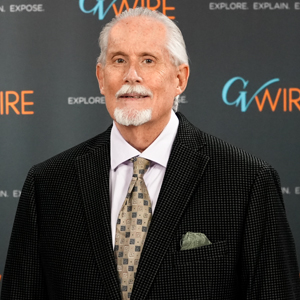Share
Pick a word.
Stunning. Exciting. Expensive.

Bill McEwen
Opinion
The cost of the school’s first phase is about $121 million. There will be three two-story academic buildings, an administration building, two gyms, locker rooms, a kitchen, ball fields, tennis courts, and outdoor basketball courts.
Phase two will deliver a visual and performing arts center with 11 classrooms, aquatics complex, and concession stands. Estimated price tag: $53 million to $63 million that will require passage of a new construction bond. Total cost: at least $174 million.

Next-Generation Learning Space
In my book, the project is worth every penny. The design by the highly respected architects at SIM-PBK, in partnership with the Division of State Architect, makes a statement: This is a district going places and it wants the best for students, teachers, and community.
By the way, this community made the same statement with the very first high school it built back in 1923. When it was unveiled, Central Union High School, at McKinley and Dickenson avenues, was the envy of school districts throughout California.

Among the design highlights: a community plaza outdoor mall that connects to an indoor campus mall with a glass ceiling.
The yet-unnamed school also will relieve overcrowded conditions at Central High School’s east campus, which opened in 1996, and the original west campus. Both rely on portable classrooms to accommodate the crush of students in the fast-growing district.
“I am extremely excited about the school,” says trustee Naindeep Singh Chann. “This is going to be an architectural statement for west Fresno for the next 20 or 30 years, and something we all can be proud of.
“It will also reduce class sizes and have a real positive impact on student learning. It’s a school that’s long overdue. But we also have a long way to go to pass a bond to put us over the finish line.”

“This is one of the biggest concerns that was constantly brought up and I hope that it will be one of the concerns the district addresses as further plans are discussed for the new high school,” Carrillo told GV Wire in April.
In the just-completed school year, more than 2,600 students attended Central East and another 1,600 were at Central West. In addition to giving students and teachers breathing room, the new high school, with its 2,400 student capacity, will allow the district to absorb the community’s on-going growth. District enrollment has kicked up nearly 10% over the past decade — and figures to accelerate over the next 10 years.
Schools Anchor a Community
The school, along with the anticipated completion of Veterans Boulevard (keep your finger crossed!), and the expected adoption of a specific plan, finally will bring cohesiveness to the disjointed jumble west of Highway 99 that often is called by residents there “the forgotten Fresno.”
The area has long been in the city’s growth plan. But City Hall ineptitude and the Great Recession have prevented the area from fulfilling its obvious potential. Perhaps with Gov. Gavin Newsom demanding that California cities develop more housing, City Hall will start treating west of 99 seriously.
Joseph Martinez is the district’s director of facilities planning. He also serves on a community committee helping to formulate the specific plan.
“We’ve been meeting for a little more than a year,” Martinez says. “There is a lot of community involvement and the plan is still going forward. We expect it to go to the Planning Commission soon.”
Let’s hope the result is “smart growth” that provides beautiful neighborhoods for families of all income levels.
A Hundred Unanswered Questions
Though the dirt is turning, it hasn’t been decided how the three campuses will be organized. Will the district go from one high school with two campuses to three high schools? Should one of them be a magnet school or a Career Tech school?
And then there’s the thorny issue of drawing boundaries, designating feeder schools, and deciding which students get to attend the beautiful new high school. The district struggled with these same issues when the east campus was built.
Superintendent Andrew Alvarado is asking a broad-based committee that includes students and parents for their recommendations on these questions and many more.
The final word rests with the trustees.
A Long Time Coming
Voters approved $152 million in Measure B bonds in 2008 with the promise that the district would “acquire, construct, equip, and furnish two new elementary schools, one middle school and one high school on property previously acquired by the district or to be acquired, including all related site improvements and facilities.” The bonds also were designated for many improvements at existing schools.
The Great Recession shredded that promise. After issuing just $56.5 million of the bonds, the district formulated a new strategy in 2016. It proposed $87.3 million in Measure C bonds, which voters approved. Nearly half of that amount is helping build the new high school. It helps that the state is contributing $41.2 million.
The good news is, the winning construction bid for the first phase, submitted by Harris Construction of Fresno, was $104.2 million — about $8 million less than the district’s estimate.
So, nearly 13 years after voters approved the money for the new high school, its doors will finally open.
Based on all the good the school will do for students, the community, and the city, the wait will be worth it.
If you question the price, know that Texas high school districts spend as much as $50 million and $60 million on their football stadiums.
As for the most expensive school built in the United States, Central’s won’t be close. That distinction belongs to Los Angeles Unified’s K-12 Robert F. Kennedy Learning Center. It checked in at $578 million.

















